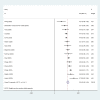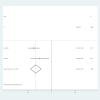Sleep problems during COVID-19 pandemic and its' association to psychological distress: A systematic review and meta-analysis
- PMID: 34131640
- PMCID: PMC8192091
- DOI: 10.1016/j.eclinm.2021.100916
Sleep problems during COVID-19 pandemic and its' association to psychological distress: A systematic review and meta-analysis
Abstract
Background: The emerging novel coronavirus disease 2019 (COVID-19) has become one of the leading cause of deaths worldwide in 2020. The present systematic review and meta-analysis estimated the magnitude of sleep problems during the COVID-19 pandemic and its relationship with psychological distress.
Methods: Five academic databases (Scopus, PubMed Central, ProQuest, ISI Web of Knowledge, and Embase) were searched. Observational studies including case-control studies and cross-sectional studies were included if relevant data relationships were reported (i.e., sleep assessed utilizing the Pittsburgh Sleep Quality Index or Insomnia Severity Index). All the studies were English, peer-reviewed papers published between December 2019 and February 2021. PROSPERO registration number: CRD42020181644.
Findings: 168 cross-sectional, four case-control, and five longitudinal design papers comprising 345,270 participants from 39 countries were identified. The corrected pooled estimated prevalence of sleep problems were 31% among healthcare professionals, 18% among the general population, and 57% among COVID-19 patients (all p-values < 0.05). Sleep problems were associated with depression among healthcare professionals, the general population, and COVID-19 patients, with Fisher's Z scores of -0.28, -0.30, and -0.36, respectively. Sleep problems were positively (and moderately) associated with anxiety among healthcare professionals, the general population, and COVID-19 patients, with Fisher's z scores of 0.55, 0.48, and 0.49, respectively.
Interpretation: Sleep problems appear to have been common during the ongoing COVID-19 pandemic. Moreover, sleep problems were found to be associated with higher levels of psychological distress. With the use of effective programs treating sleep problems, psychological distress may be reduced. Vice versa, the use of effective programs treating psychological distress, sleep problems may be reduced.
Funding: The present study received no funding.
Keywords: COVID-19; COVID-19 patients; General population; Healthcare workers; Meta-analysis; Sleep problems.
© 2021 The Author(s).
Conflict of interest statement
Chung-Ying Lin was supported in part by a research grant from the Ministry of Science and Technology, Taiwan (MOST109-2327-B-006-005). All other authors have nothing to declare.
Figures
















References
-
- Nowbar A.N., Gitto M., Howard J.P., Francis D.P., Al-Lamee R. Mortality from ischemic heart disease: Analysis of data from the World Health Organization and coronary artery disease risk factors From NCD Risk Factor Collaboration. Circulation: Cardiovascular Quality and Outcomes. 2019;12 - PMC - PubMed
-
- WHO . World Health Organization; Switzerland: 2020. Coronavirus disease 2019 (COVID-19): situation report, 72.
-
- WHO . World Health Organization; Geneva, Switzerland: 2020. WHO Coronavirus Disease (COVID-19) Dashboard.

